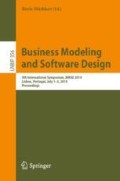Abstract
We investigate the use of deep reinforcement learning to optimize business processes in a business support system. The focus of this paper is to investigate how a reinforcement learning algorithm named Q-Learning, using deep learning, can be configured in order to support optimization of business processes in an environment which includes some degree of uncertainty. We make the investigation possible by implementing a software agent with the help of a deep learning tool set. The study shows that reinforcement learning is a useful technique for business process optimization but more guidance regarding parameter setting is needed in this area.
Access this chapter
Tax calculation will be finalised at checkout
Purchases are for personal use only
References
Aspray, W., Keil-Slawik, R., Parnas, D.L.: Position papers for Dagstuhl seminar 9635 on history of software engineering. Hist. Softw. Eng., 61 (1997)
Born, M., Brelage, C., Markovic, I., Pfeiffer, D., Weber, I.: Auto-completion for executable business process models. In: Ardagna, D., Mecella, M., Yang, J. (eds.) BPM 2008. LNBIP, vol. 17, pp. 510–515. Springer, Heidelberg (2009). https://doi.org/10.1007/978-3-642-00328-8_51
Borrajo, F., Bueno, Y., de Pablo, I., Santos, B., Fernández, F., García, J., Sagredo, I.: SIMBA: a simulator for business education and research. Decis. Support Syst. 48(3), 498–506 (2010)
Geman, S.: Hierarchy in machine and natural vision. In: Proceedings of the 11th Scandinavian Conference on Image Analysis, pp. 1–13 (1999)
Goodfellow, I., Bengio, Y., Courville, A.: Deep Learning. MIT Press, Cambridge (2016)
Hevner, A.R., March, S.T., Park, J., Ram, S.: Design science in the information systems research. MSI Q. 28(1), 75–105 (2004)
Huang, Z., Van Der Aalst, W.M., Lu, X., Duan, H.: Reinforcement learning based resource allocation in business process management. Data Knowl. Eng. 70(1), 127–145 (2011)
Keras: Keras (2018). https://keras.io/. Accessed 30 Nov 2018
Kochenderfer, M.: Decision Making Under Uncertainty. MIT Press, Cambridge (2015)
Lillicrap, T.P., et al.: Continuous control with deep reinforcement learning. ArXiv e-prints, September 2015. arXiv:1509.02971
Lin, F.R., Pai, Y.H.: Using multi-agent simulation and learning to design new business processes. IEEE Trans. Syst. Man Cybernet. Part A (Syst. Hum.) 30(3), 380–384 (2000)
Mnih, V., et al.: Human-level control through deep reinforcement learning. Nature 518, 529 (2015)
OpenAI: OpenAI Gym (2018). https://gym.openai.com/. Accessed 30 Nov 2018
Pask, G.: Conversation Theory. Elsevier, Amsterdam (1976)
Silvander, J., Wilson, M., Wnuk, K.: Encouraging business flexibility by improved context descriptions. In: Shishkov, B. (ed.) Proceedings of the Seventh International Symposium on Business Modeling and Software Design, Barcelona, ScitePress, pp. 225–228 (2017)
Silvander, J., Wilson, M., Wnuk, K., Svahnberg, M.: Supporting continuous changes to business intents. Int. J. Softw. Eng. Knowl. Eng. 27(8), 1167–1198 (2017)
Sutton, R., Barto, A.: Reinforcement Learning: An Introduction, 2nd edn. A Bradford Book, Hardcover (2018)
Tensorflow: Tensorflow (2018). https://www.tensorflow.org/. Accessed 30 Nov 2018
Wang, H., Zhou, X., Zhou, X., Liu, W., Li, W., Bouguettaya, A.: Adaptive service composition based on reinforcement learning. In: Maglio, P.P., Weske, M., Yang, J., Fantinato, M. (eds.) ICSOC 2010. LNCS, vol. 6470, pp. 92–107. Springer, Heidelberg (2010). https://doi.org/10.1007/978-3-642-17358-5_7
Acknowledgements
We would like to thank the reviewers for their valuable comments.
Author information
Authors and Affiliations
Corresponding author
Editor information
Editors and Affiliations
Rights and permissions
Copyright information
© 2019 Springer Nature Switzerland AG
About this paper
Cite this paper
Silvander, J. (2019). Business Process Optimization with Reinforcement Learning. In: Shishkov, B. (eds) Business Modeling and Software Design. BMSD 2019. Lecture Notes in Business Information Processing, vol 356. Springer, Cham. https://doi.org/10.1007/978-3-030-24854-3_13
Download citation
DOI: https://doi.org/10.1007/978-3-030-24854-3_13
Published:
Publisher Name: Springer, Cham
Print ISBN: 978-3-030-24853-6
Online ISBN: 978-3-030-24854-3
eBook Packages: Computer ScienceComputer Science (R0)

